#Grim Moses
Text
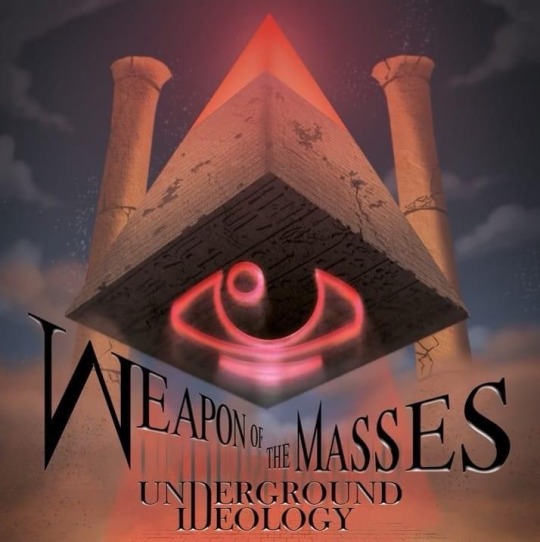
New Music: Weapon Of The Masses - Underground Ideology LP
Ch-check it! Our fam Weapon Of The Masses is back with a fresh new album!
The long running San Gabriel Valley based crew just dropped Underground Ideology yesterday, May 11th via Diggin Daily.
Big shout out to MC Ewok One of Weapons for the shout out on “Come Here Son,” featuring Joe Baggs and Grim Moses. Bang that!
#hiphop#rap#west coast#Weapon Of The Masses#MC Ewok One#Edword#DJ Rawz#Traviller#indie rap#SGV Hiphop#Arguer#Diggin Daily#Ray-Ray#Joe Baggs#Grim Moses
0 notes
Text

Moses and his mare Grim Weeper
#simblr#ts4 simblr#ts4 edit#s4 edit#ts4 horse ranch#ts4 photos#oc: Moses#ts4#sims 4#the sims 4#los sims 4#los sims#ts4 gameplay
283 notes
·
View notes
Note
God I love ur art so much I just wanna squeeze it to bits- but anywho- what's your inspiration behind ur designs? By the way the lamb is posed i just- really think of aztec art for some reason, but they're all so cool GRAAAAH
Oh my gosh thank you!! That's so lovely to hear, you've made my day!
As for the inspiration of the bishops and lamb, they're a cacophony of a multitude of things.
Ancient Egyptian mythology, Ancient Greek mythology, Aztec mythology, The Divine Comedy, and EVEN the bible. Since the cult of the lamb is just drowning in symbology I wanted to really coat it in things that make the bishops look like GODS.
Leshy was inspired by Dionysus (whoever guessed that in the tags you were absolutely correct), Heket was inspired by Demeter, Kallamar was inspired by Seth and various mythological sea creatures, and Shamura (you'd be surprised) by The Art of War, not a specific god, but rather philosophers, particularly Miyamoto Musashi who was quite the ruthless samurai turned that retired into a philosopher and painter.
Narinder and Lamb are interesting though cause they were inspired by the bible. Narinder was specifically inspired by Moses and their need to correct their past ways and Sisyphus in their long journey of atoning for their sin. Lamb is inspired by a multitude of saints, Saint George and Saint David specifically with of course a healthy dose of death symbology and omens.
Almost everyone in the Cotl fandom views Lamb in a universally similar way, cutely evil or morally grey. To that I say...I don't blame you! The content is dark and grim and Lamb does it all with a smile, but I can't help but think of moments where Lamb...cries, or is scared, even enraged! When your entire kind is seemingly wiped out and you are now dead, a god gives you a promise of abilities to return back to your realm as...better, powerful, with the power to bring back the dead. What else do you really have to lose? A mortal becoming what is essentially a force of nature is so deliciously tragic and must be explored.
You are no longer the helpless sack of flesh and bone that was shivering at the sight of your family perishing, you are now death, that can decide to reverse that fate, to right the wrong of your cowardice. Much like a...specific cat trying to right the wrongs of their arrogance.
My muse just-- goes nuts for this stuff, and I'm having a blast just shoving my love of myth and tale into this very silly game.
34 notes
·
View notes
Note
you requested more Keepsakes prompts, and I have to say, I LOVE the way you write Eleanor. perhaps some little scene from her married life with Hob? general domestic bliss? or something less blissful, like getting into their first bad argument and figuring out how to deal with it?
alternatively, Hob and Morpheus go on holiday and Morph is very bad at taking vacations...
xo @hardly-an-escape
Oooooooooh. What an excellent prompt. Thank you!

Keepsakes: A Kissing Bough
Fandom: The Sandman
Series: Hob Adherent Series
Rating: Slightly Spicy. Please curate your experience accordingly.
Pairing: Hob/Eleanor
Hob and his wife have been charged with finishing the decorations before Christmas Morning and the start of the Twelvetide celebrations.
Eleanor's parents call her 'Nell' at home. It is a common enough diminutive for Eleanor, as common as 'Hob' had been in the mid 1400s, when it seemed that every Robert he met went by it.
The problem is, Hob didn't know that was her nickname. They'd been married eleven months, and he'd been calling her 'El' the whole time.
But how was he to know? The Giffords only ever called her Eleanor in public, and called him the full 'Sir Gadlen' or, 'my son-in-law', even after his marrying into the family.
No friendly "Robert-my-boy!"s from Master Gifford as Hob had secretly hoped for, as his own father had once chortled while thumping him playfully on the shoulder. The man still resented Hob for his lack of old-family connections, for all that he'd mellowed toward Hob after seeing how seriously Hob took his duties as Husband and Father. And where Master Gifford led, his wife dutifully, dolefully followed.
Not even a nice cordial "Robb dear" from Mistress Gifford in all those months.
So it is quite a surprise when, after the elder Mistress Gifford's after-supper lamp had finally burned down, and she declares her old eyes too weary to continue her needlework by firelight alone, she calls Eleanor 'Nell'.
Her husband had gone straight to bed after their meager supper, grumbling heartily about the privations of the Advent fast and how a morning of eggy pies and the Twelvetide feasts could not come fast enough.
With no husband to chivvy along before her, Mistress Gifford rises from her stately chair by the hearth in the Great Hall, and bestows each of the three Gadlens arrayed on the piled furs on the floor before it a fond kiss on the forehead. One to Hob, who helps steady her with a gentle hand on her elbow as she stoops, her own hand on his shoulder, to offer the kindness. Then one for her daughter, sat opposite him. And the last to her grandson, dozing with all the abandon of a small creature who knows that it is utterly safe and utterly loved, in his moses basket beside Hob's knee.
As she kisses them, she murmurs, "Happy Christmas Robb, Nell, my wee little Redbreast."
"Nell?" Hob asks, as soon as his mother-in-law has creaked her way out of the room. "Why have you not told me you are called Nell?"
"It is grim," she pouts. "It sounds very much like knell , wouldn't you say?" This is accompanied by a theatrical shudder that makes her bosom jiggle, and so burns its way into Hob's memories for that alone. "Death knell."
"Ah, never mind that. Death's a mug's game," Hob says, and cups her fire-warmed cheeks in his palms to bestow his own kisses on his wife. "I'm never going to die, so you shall never need ring out for me." Eleanor giggles as he digs his fingers into her hips for leverage, and scoots her closer to him, so he can bury his face against the pleasing softness of her neck. "Though you may keen in other ways for me, should you like."
"Hob!" El laughs. "Pray, do not leave a mark , we have to sit at the top table with my father in the morn—"
He had promised El that he would tell her his secret when they'd been married forty years, but here, sitting by the fire in the Great Hall, surrounded by warmth and plenty, the proof of his devotion to this life wheezing out the sweetest little snores a babe could make, he was tempted to break that oath and confess all.
There was something about the Twelvetide that encouraged confession, even now as a Protestant celebration, without a confessional to be had in a Catholic church.
"Enough," El gasps at length, pink-cheeked and panting prettily. "We have work to do, and if you wake Robyn I will be very cross with you."
The elder Giffords had left their daughter and son-in-law, with their youthful energy, to finish the kissing boughs before Christmas morning. It was well on midnight now, the feeble light from the rush-tapers dwindling and the fire in the big stone hearth beginning to fade to nothing but toasty-red coal. It was just the right sort of fire for toast.
Hob says as much.
"It is always one appetite or another with you," El huffs with a roll of her eyes, but rises. "I shall go to the kitchen, but I will share not a morsel with you when I return if these last boughs are not woven when I return. And do not throw the remaining greenery into the fire to make it look like you finished, Robert Gadlen," she scolds, catching him thinking that very thing. "There are to be twelve Crowns of Green, and I know how to count."
Hob plucks the hem of her skirt off the furs, and brings it to his lips for a revenant kiss. "As my Queen commands."
She frees herself with a smirk and an imperious tug, and sways away to the kitchen.
"There, Robyn my lad," Hob says to his son, who has opened his dark eyes just long enough to take in the spectacle of Hob's oath. "That is how you keep your wife happy. Learn the art from me, my fine wee apprentice, and you will make of me a very indulgent and biddable grandfather in no time at all."
Robyn smacks his lips, clearly unimpressed with his father's training, and returns to sleep.
Hob is in the process of tying off the ribbons of the final garland when El returns with a napkin bundle consisting of a fresh bottle of wine, an old loaf of bread, and a tiny pot of new butter.
Hob prefers old butter, likes the tangy burst of salt on his tongue, and his darling wife knows this. As such, she has also nicked one of the leftover bundles of sea salt that are meant to be gifts for her father's servants at his annual St. Stephan's feast, so Hob can powder his toast as he likes.
This is what love is, he muses, as he cuts them slices of bread with his belt-knife, and El retrieves the toasting forks from their hook by the hearth. Old bread, and stolen salt, a sneaky taste of butter before the advent fast is officially over, and a babe sleeping with his little milk-pout mouth gaping open like a little boor.
As Hob threads the bread onto the fork tines, and holds them carefully over the coals, El busies herself by tidying up the leftover sprigs of greenery. Bringing the winter growth indoors to remind the world that no winter lasts forever, that life persists and waited under the snow even now, is a tradition older than Hob himself.
He's seen Twelvetide traditions come and go, but this one persists, as immutable and comforting as knowing that in a year ending with eighty-nine, Hob's Stranger will be waiting for him.
It is nice to be younger than something.
El bundles her posy of leftover holly and mistletoe, finishing it with a crimson-red ribbon, then stands and dangles it over his head to coax a kiss out of Hob. He leans back against her legs, tips his chin up obligingly, and lets her fold down to meet him.
"If you continue to distract me, I will burn the toast, dearest wife," Hob murmurs into her mouth.
"That would be a waste," El agrees. She releases Hob to his duties, but does not relinquish the posy.
They eat toast, and brush away the crumbs and butter grease on the napkin, and share the bottle of wine between them, and laugh, and whisper in hushed voices. El holds the posy over the moses basket, and they kiss Robyn's fat cheeks. She dangles it over her head, and Hob kisses her eyelids, the tip of her nose, the dear swell of her chin. She loops the ribbon on his belt, and takes him in her mouth. When he has come to his pleasure with his fist jammed in his own mouth to prevent waking the baby, he hooks the posy on her belt and breaks his fast in the cool darkness before the dawn.
In all, they have quite a splendid Christmas morning indeed.
Like her mother before her, El chivvies her boys up to bed before the night grows too light. Robyn wakes long enough to whimper for his own break of fast, and Hob cuddles El up between his legs on the bed so he can hook his chin over her shoulder and watch Robyn's eyelashes flutter as he drinks his fill.
Morning will come soon enough.
The Christmas cake would be served to mark the official end of Advent, Hob's father-in-law would get his eggy pie, and they would all go to church so Eleanor could show off her new son to her old parish. The days of the Saints would be filled with acts of charity, feasting, dancing and delight. Someone would find the Bean in the Bread and be named the Lord of Misrule, and they would play silly games, and drink too much, and wrestle, and jest, and sing. On the Twelveth Night, Hob would gift his wife with the handsome leather-bound notation book he'd commissioned for her, a place for her to record her favorite composition. To Robyn, who was too young to know what presents and Twelvetide were, he would gift a handsome toy duck he'd spent the Advent carving. It had slappy leather feet attached to little wheels with hobnails, which clattered and flapped when one towed it along on a string.
And then the decorations will be removed from the house in order to preserve the good luck accrued through the Twelvetide, and the Gadlens would bid the Giffords a Happy New Year, and tromp home to their estate on the unfashionable south bank. Hob would review the profits for the year with Mr. Fletcher, his steward, and visit his warehouses with a gift of ale and an afternoon's leisure for his dockworkers, and come Candlemas, he'd join his groundsmen in rolling up their sleeves and readying the fields to feed the estate anew on Plough Monday.
But for now, Hob will keep his peace.
Christmas is not a time for such a confession as the one that teased at him.
"Dearest Nell," he says. "Darling Nell. My sweet call to ruination."
"No, no, you brute, stop calling me that," she gasps as he wriggled the three of them down into a comfortable nest of feathered pillows and thick wool blankets.
"My ruin?" Hob asks, mouth resting against her nape as Robyn stretched and unlatched, offering his fist to his father now that his tummy is full and he is ready to be spoiled in other ways.
Eleanor rolls over to hand the baby to Hob to wind.
"That name, you wretched, wretched man," she complains, burying herself into his side as he pats Robyn's bottom obligingly. "Call me Nell again and I shall really make you regret it."
"If that is your command, my queen, my wife, my Eleanor." He kisses her crown, her forehead, her shoulder with each oath. "Sweet El."
He expects her to reply to him with haughty teasing, but when she does not, he shifts Robyn out of the way to look at her face. She is already asleep.
"You see, my wee lad?" Hob whispers to his son. "That is how it is done."
Robyn spits up on his shoulder to show his appreciation for the lesson.
#j.m. frey#losyark#hob gadling#lord morpheus#eleanor gadlen#sir robert gadlen#robyn gadlen#dreamling#the sandman#sandman#fanfic#sandman fanfic#centennial husbands#centennial boyfriends#cling fast#cling fast adjecent#the hob adherent series#hob adherent#keepsakes#fic prompts#I am so overwhelmed by the love for this series
53 notes
·
View notes
Text

The saga of San Juan Hill, cont'd (for Part I, see this post)
On September 11, 1957, residents of San Juan Hill, the integrated, predominantly working-class neighborhood on the West Side between 59th and 65th Streets and West End and Amsterdam Avenues, showed up at City Hall. They were protesting the destruction of their homes for the purpose of building an arts complex called Lincoln Center.
The public hearing lasted nearly 11 hours, with 24 speakers supporting the project and 36 opposed. The issue was framed as housing vs. culture. They also pointed out that the housing units that Robert Moses had reluctantly agreed to build as part of the redevelopment would be out of the price range of current residents.
Two weeks later, West Side Story opened on Broadway. It took place entirely in San Juan Hill, although the community was never referred to by name. Although it's hard to believe now, the show received generally cool reviews; critics were taken aback by its grim realism and aggressive, jazzy score (by Leonard Bernstein).
Many neighborhood residents were offended by the portrayal of their home. Puerto Ricans, who made up 24% of the population who lived there, objected particularly to the line in the show-stopping number "America" that called Puerto Rico an "island of tropical diseases." (They ignored the context, which is a back-and-forth between a Puerto Rican girl who romanticizes the island and another who mocks her dreamy outlook.)
On October 25, the Board of Estimate, which was then the city's main decision-making body, held another hearing on the redevelopment project. This one lasted 18 hours, but it seemed that the Board's minds were made up. In late November, they voted unanimously to go ahead with Lincoln Center. Next June, the first residents of San Juan Hill were relocated.
In 1960, as the last of the brownstones were being demolished, a film crew moved in. It was the (first) screen version of West Side Story.
youtube
Photo: Gothamist
#vintage New York#1950s#San Juan Hill#Lincoln Center#gentrification#urban renewal#West Side Story#redevelopment#communities#slum clearance#neighborhood destruction#public hearing#Upper West Side#Youtube#September 11#Sept. 11#11 Sept.
49 notes
·
View notes
Text
Frosty Ruins The Prince Of Egypt
This is a movie I actually remember going to see in theatres as a kid. My older brother took me for my birthday and must have thought the movie was underwhelming because after we watched it he insisted we go to the toy store right after for a secondary gift. That was unneccesary because even a mediocre movie with my brother was a good time. Now I haven't seen the movie since then so let's see if that assessement of mediocre still stands.
I've never been a huge fan of Dreamworks, the first Shrek movie was great but I have trouble even picking a second favourite movie of theirs. I've always found their character designs offputting. The artwork in the movie overall is very good…the settings the backgrounds the buildings all look terrific but the characters themselves…just look goofy and not goofy in a fun way, goofy in an 'am I supposed to believe this mongoloid alien is a person' kind of way.
I hate the musical aspects of this movie as well, it just doesn't fit. The music in a story like this is to keep the kids engaged…to make otherwise dark or boring parts of the story more interesting and recapturing a short attention span. However when the story is grim and the music is grim…it just doesn't work with the sad ballads. I'm sure there are some people who like that kind of thing but I'm not one of them. Even as a kid when I liked musical cartoon feature length movies I didn't care for the music in this one at all. The music just isn't good it doesn't flow well it's not catchy or memorable and some of it is downright cringeworthy.
I can also see the movie being polarizing for the religious elements. It opens with the disclaimer that they took some artistic license but felt it was a faithful adapation of the story. However when you adapt a story there's so much room for…adding here…taking away there…altering one single word can change so much and is considered apostasy. However sometimes those changes can also bring a story more alive. One thing that stood out to me in this vein is when moses kills the slavedriver. In the movie it's presented like as though it was an accident to make him a more sympathetic character and to avoid taking a moral stance on killing oppressors. The reality is he saw his people being abused by evil men and killed one out of rage. By altering this it presents a moral perspective not present in or consistent with the Bible that says killing is always wrong no matter what. And it attempts to present Moses as a more benevolent and perfect figure than he was, which ruins the notion of God using imperfect people to do great things. They hammer this home by doing a whole song and dance about how great Moses is. Moses is feeling unworthy and he overcomes this self doubt by "looking at his life through heavens eyes" thus attributing this veneration of Moses to God. Rather than Moses bringing glory to God they reverse this and have God bringing glory to Moses. Now maybe this is intentional or maybe an accidental consequence of a slight "artistic" alteration of the story. just to give an idea for how much of a departure it is this is the full story as it appears in the Bible/Torah.
Exodus 2:11
11 Years later, after Moses had grown up, he went out to his own people, and took notice of their heavy burdens. He saw an Egyptian beating up a Hebrew, one of his own people. 12 Looking around and seeing no one else, he killed the Egyptian and hid him in the sand. 13 Going out the next day, Moses noticed two Hebrew men fighting right in front of him. He told the one who was at fault, “Why did you strike your companion?” 14 The man replied, “Who appointed you to be an official judge over us? Are you planning to kill me like you killed the Egyptian?” Then Moses became terrified and told himself, “Certainly this event has become known!”
I'm sorry but that's a wildly different story than the one presented in the film, where he accidentally bumps a man off a ledge and is immediately offered immunity by Rameses which he turns down out of guilt. This is just one example but there's more.
What I did like about the movie is that i've always hated ancient egypt…it was an evil, oppressive, demonic empire and I hate the way there's a fascination with it that doesn't acknowledge or glosses over these things. The movie showcases just a small portion of their evil and it's always fun to watch an evil empire get pwned and seeing slaves go free.
I'm very conflicted about movies like this in general, I don't like seeing Bible stories as tales to sit and watch for entertainment. This isn't a story made up to entertain it's a historical and religious story told so we'll know the tale and it's importance spiritually. I'm not opposed to it in general I'm not saying it's wrong I just have mixed feelings about it. Seeing a story about the one true God delivering people from slavery... on the shelf next to a story about an ogre rescuing a princess…I dunno man. I just don't think the word of God is meant to be a story consumed for passing the time. I think part of the problem is I found the movie aggressively mediocre…and it almost feels wrong to say that about a Bible story…but Bible stories shouldn't be judged on their entertainment value at all. It's like judging a steak dinner for how much it tastes like candy….it does a bad job of it…but it's not supposed to and is meant to do something more important for you.
Overall it's not a terrible movie and it definitely seems like it was made in earnest, it was clearly not created to be a mockery or to diminish the story, it fails in some areas but succeeds in others. I think this is more of a take it with a grain of salt thing and not a throw the whole thing out kind of thing.
C+
8 notes
·
View notes
Text
Futureland - Walter Mosley

Futureland - Walter Mosley
Projecting a near-future United States in which justice is blind in at least one eye and the ranks of the disenchanted have swollen to dangerous levels, Mosely offers nine interconnected stories whose characters appear and reappear in each others' lives. For all its denizens, from technocrats to terrorists, celebs to crooks, "Futureland" is an all-American nightmare just waiting to happen.
Nine interconnected short stories capture the high-tech world of the United States in the near future, capturing the lives and fates of such characters as Ptolemy Bent, a child genius whose merciful actions land him in a privatized prison, and Fera Jones, a heavyweight boxing champ who abandons the ring for a political career. 75,000 first printing.
Editorial Reviews
Amazon.com Review
Futureland is bestselling mystery author Walter Mosley's first science fiction book since Blue Light, a New York Times Notable Book of the Year. Futureland's nine linked stories will provide an accessible and intelligent introduction to written science fiction for mystery or mainstream fiction fans who do not normally read the genre.
Experienced science fiction readers, however, may be less than satisfied with Futureland. Reading it, you might decide Mr. Mosley grew up reading SF, respects the genre, and still watches SF movies, but has read little SF written during or after the New Wave of the 1960s. However, something more may be going on here than a genre newcomer making beginning-SF-writer mistakes. Mr. Mosley may be deliberately, and craftily, creating SF accessible to his large non-SF readership and to others who are strangers to this genre.
Some have labeled Futureland cyberpunk, and it does present a dark, infotech-saturated, corporation-controlled future; but it is in fact an inversion of cyberpunk. Instead of that subgenre's cliche of cool, cutting-edge, street-smart, but not very believable outlaws who out-hack and outwit powerful multinational corporations, this Dante-esque collection presents outlaws and outcasts who may be street-wise, but who have little chance of overcoming the corporations and governments that control, and sometimes take, their lives. Like shockingly few other SF works, Futureland directly examines the lives of the working and the nonworking classes, the poor and the marginalized, the criminal and the criminalized. In other words, Futureland is set in a world quite alien to many veteran SF readers, and is therefore a book they should try. --Cynthia Ward
From Publishers Weekly
After the qualified success of his first science fiction novel, Blue Light (1998), Mosley (best known for such mystery fiction as the Easy Rawlins series) returns with nine linked short stories set in a grim, cyberpunkish near-future. Unfortunately, heavy-handed plotting and unconvincing extrapolation weaken the collection's earnest social message. "Whispers in the Dark" introduces prodigy Ptolemy Bent, who will grow to be the smartest man in the world in spite of his poverty-ridden childhood. Ptolemy reappears in "Doctor Kismet" as an adviser to assassins trying to kill the richest, most corrupt man in the world and as the brains behind a series of global plots to overthrow the status quo in "En Masse" and "The Nig in Me." Champion boxer and much-hyped female role model Fera Jones steps away from the ring to take hands-on responsibility for the influence she wields in "The Greatest." With its easily befuddled talking computer justice system, "Little Brother" is more Star Trek than high-tech cyberpunk. In more familiar territory for Mosley, PI Folio Johnson investigates a series of murders linked to Doctor Kismet in "The Electric Eye." Although packaged as SF, this book is likely to disappoint readers of that genre who've already seen Mosley's themes of racial and economic rebellion more convincingly handled by authors like Octavia Butler. Mystery fans, on the other hand, are far more likely to embrace this latest example of Mosley's SF vision, with its comfortably familiar noirish tone and characters, than they did Blue Light. (Nov. 12)Forecast: With a five-city author tour and national print advertising, both mainstream and genre, this title book should be slated for solid sales.
Copyright 2001 Cahners Business Information, Inc.
From Library Journal
Mosley's first foray into writing science fiction since Blue Light (LJ 10/1/98), these interrelated stories, set in the near future, read as a natural but chilling extension of our present. From child genius Ptolemy Bent, sentenced to prison for euthanizing his grandmother and uncle, to female boxer Fera, who becomes a feminist icon for the 21st century, his characters battle for both personal survival and a chance to turn back the clock. In this futuristic world, privacy is little but a memory and prejudice and suspicion still sour race relations. Mosley's reputation as the best-selling author of the Easy Rawlins mysteries may entice a number of his regular readers to pick up this book, where they will find some of the same bleak outlook, flashes of insight, and true-to-life African American characters. An additional audience will come from iPublish.com, where the first two stories were previously published as e-books. Recommended for all public libraries.
- Rachel Singer Gordon, Franklin Park P.L., IL
Copyright 2001 Reed Business Information, Inc.
From Booklist
Mystery star Mosley tries his hand at science fiction again, to better effect than in the novel Blue Light (1998). For these nine interconnected stories, he conjures a mid-twenty-first-century world in which one company is the most powerful force in the world and political correctness is the law. The only significant revolutionaries are black, and blacks and whites are still highly antagonistic. All Mosley's good guys are black, including the smartest man in the world, imprisoned for assisting the deaths of his ailing grandmother and uncle; the world's heavyweight boxing champ--a six-foot-nine-inch woman who goes into politics after KO'ing the male heavyweight champ in less than a minute of round one; a private dick who solves cases with the help of a greatly enhanced artificial eye; and a regular-joe worker who becomes the reader's eyewitness to the dawn of a new world when a backfiring biological weapon kills everyone who isn't at least 12.5 percent black. Lest that last bit of business seem too black-triumphalist, the worker-hero quickly discovers that intraspecies predation hasn't vanished. Ably slinging the technobabble to explain the odd wonder-gadget in his tales, and greasing them with plenty of "oh-baby" sex, Mosley creates sf in which Shaft and Superfly would feel at home. Can ya dig it? Ray Olson
Copyright © American Library Association. All rights reserved
About the Author
Walter Mosley is the author of the New York Times bestselling Easy Rawlins novels. He lives in New York City.
#Futureland#Walter Mosley#fiction#the future of the us after anarchy in 9 stories#technocrats to terrorists#celebs to crooks#all-American nightmare
3 notes
·
View notes
Text
On Xenia, Missionary Work, and Living in a Broken World
I'm still getting used to writing these blogs, but I had something nagging at me from earlier today, I hope this essay does it justice. Long post ahead!
A friend of mine, not a close friend but still a friend, works at a sit-down restaurant and has shared difficulties with life and the service industry with me. Earlier, they shared that a Christian group visited their restaurant, ordered notably expensive food including steaks, and were not generally the best customers, but they left a $100 tip to my friend at the end of their stay.
This bill, however, turned out to be fake. On closer examination, it was a concealed note made to look like a $100 bill advertising a local Christian group, informing them that "Jesus is worth more than this bill!" followed by an ad for their congregation. Setting aside that the bill was literally worthless, as it was not worth any money, this... upset me. But let's peel back a little.
A common theme among religions is that the gods show up in the poorest of society. The concept of Xenia in Hellenic Polytheist religious belief and Ancient Greek society is built around the idea that Zeus and any other deity could appear as a poor beggar asking to sleep under your roof in the rain, or at least that they might be watching.
For those who may not see things so literally, it is still fundamentally a religious matter that humans built the world and make it what it is, even if we all still dance to the invisible tune of the Theoi and the Fates, and that we have some kind of a responsibility to build a better world from those who walked before us.
All of that is pretty common among religions, with only the details changing. Buddha lived as an ascetic with his only shelter being a tree where he had his awakening, the ancient Israelis were penniless slaves who were led by Moses who was essentially an exiled refugee, Jesus was a peasant carpenter, etc. The idea that the divine comes to our without money at their lowest is not new.
There is, however, a very toxic mentality that I have mostly observed among preaching and missionary Christian groups. It is that, because Jesus lived without money, that he is the wealth that matters. The idea being that faith in Jesus is the only thing that matters, as someone without him is damned, and the more souls you save by making them realize his supposed trueness makes you a better person by making them realize this, and possibly earns you better brownies in Heaven.
This is, however, disregarding virtually every other cultural experience in exchange for having this world view. Well-adjusted, comfortable and safe communities who worship a different god must obviously be proselytized against in this view of the world, for even the happy and comfortable cannot truly be happy for they do not know the son of your sun god if you seek conversion rates above all else in the mortal world. We have all seen this in effect.
There is a grim cowardice to this entire world view. It is a fundamental unwillingness to see the perspectives of others, to have empathy, and move your mind out of your own head. In this world view, no one who isn't you can be happy and good, all must be bent to your shape to match the perfection that you were so obviously built in.
I was raised Mormon, and this cowardice has been weaponized to an enormous degree by building entire cultural cornerstones by preaching and conversion and proselytization. Those who do not surrender vast sums of money in order to travel to strange places without friends and family purely so they can bother other people with this 'truth' that they do not want... well, to not do it makes you less than a person to the Church, unworthy of the paradise they promise you.
I in no way wish to state that sharing religion is bad. Talking to people that you know, sharing your world view, talking about what you believe, telling them about the beauty of the divine that you have witnessed, all of these I feel are an innate good. But if you see the world narrower than a pinhole, if you believe that every humans who is born, toils and dies under our sun must believe in Jesus and God in order to have a shred of value and thus seek to force it on them by any means necessary, you have perverted the entire arrangement.
Dan Olson did a wonderful documentary on Flat Earth and qAnon in which he stated that to Flat Earthers, they are not simply in ignorance of geography, but that the simple denial of truth is a weapon, a tool, in which they seek to build the world in their image by denial of facts through a force of will to build a metaphorical flat earth in which they are right and their enemies are silent. When you do not seek to enlighten, to share, to learn, and instead seek to use your will, words and resources in order to hammer anyone you ever meet into a familiar shape, to build the good little Christian paradise on Earth that is so clearly strangling those who do not see it as a paradise, you have built a horror.
And it is into this environment that the final horrors take shape. The denial of refugee aid by powerful religious organizations without conversion, the refusal of helping others without getting something in return, the clawing tendrils of rigid enforcement of religion and culture that forces people into your group for fear of leaving it, the refugees and poorest people in my city who were forcefully converted by missionaries in return for food and shelter is the final result of such a narrow world view, in viewing every human as needing to conform to you and your way. This is homousian as the horrors that have ravaged the planet for centuries, that has devastated native cultures, killed generations of queer people, and built the worst of the world.
It is in all of this that the introduction to this essay began. A Hellenic Polytheist, working a thankless job, bringing fine steaks to those who taunted them with fake money while promising that their note had the only thing of value.
What if I told you that my friend was moving away from an abusive lover or parent and desperately needed money for shelter? If they were trying to scrounge together money to pay for insulin without insurance? What if I told you they were paying for an unexpected funeral and were facing the reality of being unable to bury a loved one? What if I told you they had cancer and needed every penny to get surgery and chemotherapy?
Thankfully, they do not have any of these things to my knowledge, and were simply annoyed. But to dangle a religious truth that they are not interested in, teasing them with the money that, to the knowledge of these Christians, may have saved their lives, while taunting them that your carpenter god would cure these things for fealty like a feudal lord, is a vile and small-minded idea. That this person was likely not the sole executor of this evil and likely was simply promised by higher-ups that they were doing good, that they meant well and genuinely thought they were helping, does not decrease the horror of the world and mindset that would create this circumstance. Because next time it will be someone with cancer you yank hope away from.
I hope, dear reader, that you can extract my meaning on the purpose of Xenia, and good deeds from this, and see a small piece of the dark horror that small minds and narrow eyes can build. When Zeus appears at your doorstep dressed as a ascetic beggar, the fact that this beggar may not be Hellenic does not matter. That he may not be your color, or that he may not be healthy, or that he may be different, is not an excuse not to be kind, to think outside of your own experience, and to embrace those who need us the most. Because your $5 and your kindness and understanding to your waiter or barista or your uber driver is far, far more valuable than a pamphlet and a condemnation.
I'd like to send you off with a small story I like about the Buddha. This story is neither historical nor truly about the Buddha, but it is an enlightening tale containing a deep religious truth told through fiction, not unlike our Greek mythology:
While the Buddha meditated beneath his Bodhi tree, searching for truth and enlightenment, he peered beyond the mortal realm and saw a thief in hell who had repented and begged forgiveness. The Buddha, seeing that the man wanted to change, to come back to Samsara and to fight to be a better man, lowered a spider's web into hell for him to climb.
The Thief graciously began climbing up towards the Buddha. However, the other denizens of hell began climbing up after him, and he feared that the delicate spider's web would break and take him back to hell, so he began kicking them off. The spider's web was stronger than the finest steel and could have taken all of them, but his kicking broke it like it was thread.
Be kind, love each other, and always seek a better world.
-Lady Nikki
#hellenic polytheism#dodekatheism#hellenic pagan#pagan#hellenism#zeus deity#xenia#buddhism#dharma#spirituality#philosophy#anti capitalism#anti missionary
42 notes
·
View notes
Text
top ten songs (w lyrics)
Daniel in the Den - Bastille
Shadown Moses - bring me the horizon
Have Fun - Unlike Pluto
Hummingbird - Unlike Pluto
Icarus - Bastille
Fata Morgana - Unlike Pluto
I'm Not Suprised - Unlike Pluto
OREGON BOYZ - grim salvo
Origami - Unlike Pluto
Send Them Off! - Bastille
v much subject to change
4 notes
·
View notes
Text
TWST said by me and others 4
Cater: This food slaps Trey!
Malleus: *appears out of nowhere* What does “slaps” mean?
Cater: It’s like really good…
*at Diasomnia*
Malleus: Lilia this music slaps.
Lilia: *SHOOK* WHO TAUGHT YOU THAT?!
Malleus: I heard Cater say it.
Silver: Never use it again.
••
Kalim: I want peanuts
Kalim: Pea-nuts~
••
Sam: *points at Lucius* He looks like a Moses.
Trein (offended): Well Grim could also be a Moses.
Vargas: Yea he looks like he could part the Red Sea.
••
Floyd (messing with Ace): Eels aren’t fish
Ace: Yes they are!
Floyd: Nope
Ace: YES THEY ARE! *looks it up* see *reads what he finds*
Floyd: Well it’s wrong, any thing with teeth aren’t fish
Ace: What about parrot fish?
Floyd: Those are a type of bird.
Ace: What about the fish with teeth?
Floyd: Those are mammals.
*this goes on for a while*
••
Kalim: I’m high~
Jamil: Nice, don’t tell anyone.
Kalim: Ok
*meanwhile during club time*
Kalim: Today was high.
Cater: Lucky
Lilia: Nice
••
#twst#twisted wonderland#cater diamond#lilia vanrouge#malleus draconia#twst silver#kalim al asim#twst sam#mozus trein#ashton vargas#ace trappola#floyd leech#jamil viper
78 notes
·
View notes
Note
Do you know anything about Samaël?
Samaël angel of death, many people believe he's lucifer or believe he's satan (every story is different))
I just need to know what his role is/was and what he has to do with Lucifer, thank you for reading
Hello. Thank you for your ask.
Samaël (The Venom Of God) is said to be a fallen angel, that's why he's confused with Satan. But Samaël is regarded as good and evil. He is said to work under the command of God.
In Jewish lore, in Midrashic texts, he's considered to be a member of the heavenly host with often grim and destructive duties. One of Samaël's greatest roles in Jewish lore is that of the main angel of death and the head of satans. Although he condones the sins of man, he remains one of God's servants.
Samaël was said to be the The Serpent who tempted Eve into sin. He seduced her and she had Samaël's baby named Cain. (Cain is from the bible. Committed the first murder by killing his own brother.)
Samaël then became the consort of Adam's first wife, Lilith, who is said to be his sexual partner. He created with her a host of demon children.
God feared that the Samaël and Lilith would plague the world with their heinous progenies, and castrated the corrupt angel.
According to "The Ascension of Moses, Samaël is also mentioned as being in 7th Heaven.
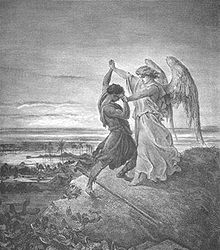
That's all i know about him for now.
I hope this helps.
29 notes
·
View notes
Photo
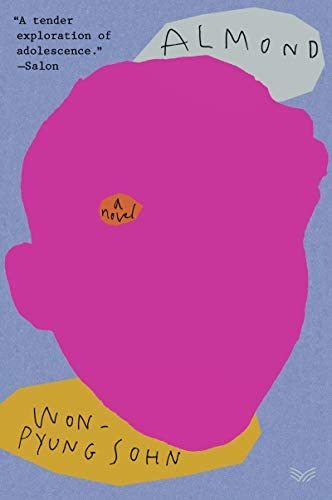
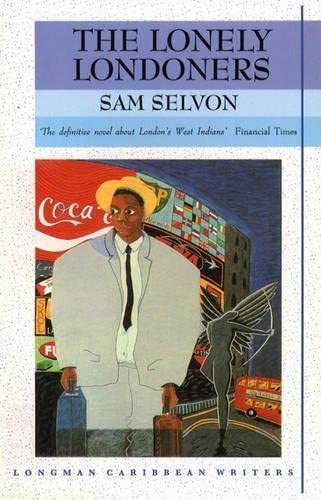



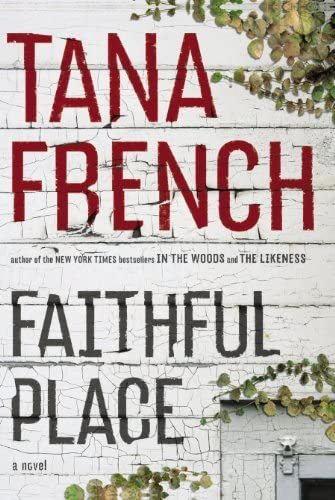


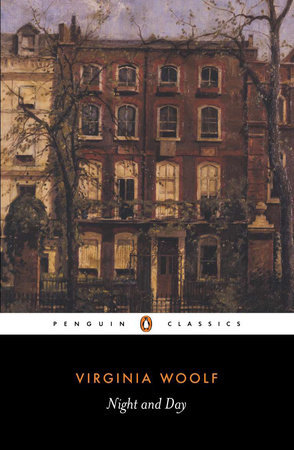

(some of) my top books of 2022: prose edition
Last year I made a post with some of my favorite books, using first lines and bullet points. This year I read about twice as many books, so this certainly won’t cover all of them, but it’s a selection -- and I’ll make a separate post for the poetry.
1. Almond by Won-Pyung Sohn (trans. Sandy Joosun Lee)
I won’t tell you whether it has a happy ending or a tragic ending.
Because, first of all, every story becomes boring once the ending is spoiled.
Second of all, not telling you will make you more engaged in this one.
you should read it if you like:
coming of age novels
thinking about what makes humans human
delicate character development
2. The Lonely Londoners by Sam Selvon
One grim winter evening, when it had a kind of unrealness about London, with a fog sleeping restlessly over the city and the lights showing in the blur as if is not London at all but some strange place on another planet, Moses Aloetta hop on a number 46 bus at the corner of Chepstow Road and Westbourne Grove to go to Waterloo to meet a fellar who was coming from Trinidad on the boat-train.
you should read it if you like:
novels about city life
vibrant prose
thinking about the immigrant experience
3. The Memory Police by Yoko Ogawa (trans. Stephen Snyder)
I sometimes wonder what was disappeared first -- among all the things that have vanished from the island.
you should read it if you like:
stories of loss and memory
elegant allegory
books that leave you with a haunted, desolate feeling
[note: this was my first book of the year, and i kind of worry that’s why 2022 went the way it did...]
4. The Stone Face by William Gardner Smith
He leaned forward on the edge of his seat, his chin in his palms and his elbows on his knees, rocking imperceptibly to the movement of the train. It was evening, and in the fading light beyond the window the flat green-and-brown French farmland hurried by. He found his lips almost forming a prayer; not in words, not to a God, but in an emotion reaching out to the earth, the sky, to the world in general.
you should read it if you like:
books that face head on the question of our duty and responsibility to fight for a more just world
nuanced, empathetic explorations of people and relationships
powerful, vivid prose
5. The True Deceiver by Tove Jansson (trans. Thomas Teal)
It was an ordinary dark winter morning, and snow was still falling. No window in the village showed a light. Katri screened the lamp so she wouldn't wake her brother while she made coffee and put the Thermos beside his bed.
you should read it if you like:
quiet, understated books
seeing unexpected human connection
books that inhabit nature and the seasons
6. Faithful Place by Tana French
In all your life, only a few moments matter. Mostly you never get a good look at them except in hindsight, long after they've zipped past you: the moment when you decided whether to talk to that girl, slow down on that blind bend, stop and find that condom. I was lucky, I guess you could call it. I got to see one of mine face-to-face, and recognize it for what it was.
you should read it if you like:
long-buried secrets
characters haunted by the past
some really messy families
7. The Glass Palace by Amitav Ghosh
There was only one person in the food-stall who knew exactly what that sound was that was rolling in across the plain, along the silver curve of the Irrawaddy, to the western wall of Mandalay's fort.
you should read it if you like:
sprawling multi-generational tales
intricate, atmospheric historical novels
thinking about the complex entanglements of people and events within history
8. I Wonder as I Wander by Langston Hughes
When I was twenty-seven the stock-market crash came. When I was twenty-eight, my personal crash came. Then I guess I woke up. So. when I was almost thirty, I began to make my living from writing. This is the story of a Negro who wanted to make his living from poems and stories.
you should read it if you like:
literary memoirs
a way of approaching things with humor
seeing the 1930s across europe, asia, and the US brought vividly to life
9. Night and Day by Virginia Woolf
It was a Sunday evening in October, and in common with many other young ladies of her class, Katharine Hilbery was pouring out tea. Perhaps a fifth part of her mind was thus occupied, and the remaining parts leapt over the little barrier of day which interposed between Monday morning and this rather subdued moment, and played with the things one does voluntarily and normally in the daylight.
you should read it if you like:
careful psychological studies
stories of 20-somethings figuring out their feelings
prose that flows like butter
10. Noon, 22nd Century by Arkady and Boris Strugatsky
Когда рыжий песок под гусеницами краулера вдруг осел, Петр Алексеевич Новаго дал задний ход и крикнул Манделю: «Соскакивай!» Краулер задергался, разбрасывая тучи песка и пыли, и стал переворачиваться кормой кверху. [When the orange sand under the crawler’s tracks suddenly subsided, Pyotr Alekseevich Novago backed up and shouted to Mandel: “Hop off!” The crawler shuddered, tossing up clouds of sand and dust, and began to turn stern-up.]
you should read this if you like:
hopeful sci-fi
stories about friendship
thinking about humanity’s first steps towards alien encounter
[note: this is available in english as a pdf online, i’ve checked]
looking back, are there any running themes? perhaps whether humans are by and large good, or when they are capable of goodness. finding connection, sometimes against great odds. an even mix of stories about leaving home and stories about staying there. covers that have people on them?
stayed tuned for pt. 2: poetry edition!
24 notes
·
View notes
Text
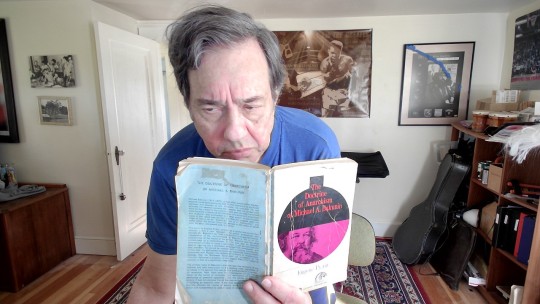

Read!
A Nonentity Turns 70
Stephen Jay Morris
2/20/2024
©Scientific Morality
Easter Sunday falls on my birthday this year. The last time that happened was in 2013. In my mind, it represents a kind of resurrection in my life. Maybe I’ll become famous—like Colonel Sanders or Grandma Moses—in my later years. Nah! That is one big pipedream of mine. This is the only life I have known and probably will be the only one I have. I hope that religion is wrong. I don’t want to live forever in bliss or in agonizing pain in hell. I embrace my mortality.
My past was littered in pain, struggle, humiliation, sickness, failure, lousy sex, poverty, and other negativities. However, I had moments of happiness, in 15-minute gradations. I was happy when I married Pamela on May 3, 1987. Plus, the time my song was on the radio in 1980. When I did have them, my periods of happiness were intense.
Before I fall asleep at night, I think about my past. I know it’s bad for my mental health, so I try to avoid reminiscing about the past. However, I don’t think about the bad times, only the good. I think about people I liked and wonder what ever happened to them. A lot of senior citizens like to bore younger people with long stories about their past—another thing I avoid. But the past can be informative to a new generation. There is that famous Winston Churchill quote: “Anyone who was not a liberal at 20 years of age had no heart, while anyone who was still a liberal at 40 had no head!” My head is attached to my torso just fine, thank you very much. My political views are to the extreme left at my old age. Why? Because, in my opinion, pragmatism is not a sign of maturity and creativity is a sign of happiness. Regardless, I have never wanted to be part of the two-party system.
So, what about the present? It consists of problems, more problems, and many more problems. I’ve got major health issues and, thanks to the untaxed one percent, we’ve got inflation. Yesterday I saw a single serving can of soup for $2.10. Jesus! The present sucks as far as G.O. politics, American politics, and religion goes. And thanks to the Likud party dropping bombs on Palestine’s innocent civilians, anti-Semitism has made a big comeback.
What about the future? At this point, I just don’t know. Pamela and I no longer like living here and want to move. The Catskill Mountains is a nice vacation destination, but we’ve come to find that some of its inhabitants are obnoxious white trash. We’ve got deer hunters, meth head Zoomers, MAGA dick heads, paranoid old ladies, and a gas station that sells over-priced junk food. Oh, and there are the Orthodox Jews who are a-social. Not a desirable location for us at all.
Being a nonentity is like being invisible. The way my life is going, I have zero influence. I am learning to control my ego. I am settling for less because I have no choice in the matter. I am going to be featured in two books, so I was told. My story will be in print if anybody cares. I do want to travel and see other lands before the grim reaper comes for me. Maybe death is just closing your eyes and never opening them again. I don’t know; I just don’t know.
And now, here come the 70’s. I could live to a hundred years old or die tomorrow. When you are my age, you can go at any time. Life expectancy for males is now 73. Yeah, I am afraid to die, but I can’t stop it. It’s all about acceptance of physical law.
I wonder, who is going to die first? Biden or Trump? – Socrates said: “Be of good cheer about death and know this as a truth, that no evil can happen to a good man, either in life or after death.
#stephenjaymorris#poets on tumblr#american politics#poets of tumblr#baby boomers#anarchopunk#anarchocommunism#anarcho primitivism#anarcho punk#anarcho syndicalism#anarchofeminism#anarcho nihilism
2 notes
·
View notes
Note
Tumblr's goof aside; what WOULD some of the Rejuv characters dress up as for Halloween?
Venam Saki and Amber would dress up as witch sisters (ft mismagius)
Melia would dress up with something to do with Mimikyu
Ren would dress up as Corviknight but Spooky Crow vibes.
Reina would dress up like a Swoobat
Mosely would be a lil pumpkaboo
Aelita would be a cherrim (Flower petals surrounding her face and then her face painted like cherrims)
Erin would be the grim reaper with a scythe that looks like absols
Kanon would literally just have a bedsheet over him with two holes for his eyes.
That's all I can think of right now!!
39 notes
·
View notes
Text

Could Sam Fisher do the first Metal Gear Solid Game better than Solid Snake?

One of the most fun research assignments back in the Wild West Days of researching was looking through Metal Gear and Splinter Cell. I was so convinced Sam Fisher would beat Snake because when it comes to Stealth Fisher was superior. But the pesky thing about Death Battle is we have a bunch of other stats that are important and Snake was superior in those. But I still think that Fisher is the better Espionage Agent to Snake. So let’s put Fisher through the first Metal Gear Solid game to see if he could.
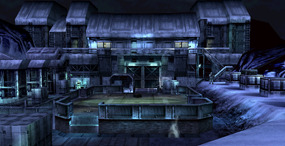
Scenario
In 2005, FOXHOUND and a group of Next-Generation Special Forces took over Shadow Moses and Metal Gear REX, a giant walking nuclear missile launcher. They want the body of Big Boss or else they'll launch a Worldwide Nuclear Strike. Under the orders of Jim Houseman, then Secretary of Defense, Roy Cambell and Solid Snake were called into action. The reason: he wanted to use the FOXDIE virus to take out the terrorist and reclaim the Metal Gear and soldiers bodies.
For this scenario, instead of trusting Solid Snake, our Secretary of Defense is entrusting Third Echelon, which was established in 2003 (or the 90s if you follow the books). This would also only use Sam Fisher from the first game, since that took place in 2004. FOXDIE would still be a factor though this would be a more intentional usage of it. This is Black Ops after all.

Pre-Game
So what does Sam Fisher have the advantage of in the beginning compared to Snake? For starters, since FOXDIE is given to him under Third Echelon, there would be no interfering from Naomi. Too boot, since she does not have a grudge on Sam Fisher like she would with Snake, there would be no need for corrupting the FOXDIE to kill Fisher as well. So Fisher would be injected with this virus and for the time being, will have no consequences in this mission.
Unlike Snake who basically had nothing, Sam Fisher has a choice of weapons he brings. Starting off with the SC-20K Modular Assault Weapons System. This baby has a 1.5× magnified telescopic sight and an integral silencer. It's Computer assisted to help with aim. And it can be converted to use specific ammo and be a Shotgun, an Assault Rifle or a Sniper Rifle. It’s three guns in one. More if you include ammo like the sticky shocker or the gas grenade.
If he wants something smaller, he always has the FN Five-seveN, a lightweight, semi-automatic pistol that uses unique 5.7 × 28mm ammunition. There’s also wall mines, M67 grenade, OPerational SATellite Uplink, Multi-Vision Goggles, Optic Cable (to see in a room before entering), Tactical Audio Kit, Camera Jammers, Ring Airfoil Projectile, and a Sticky Camera. Sam is entering this well equipped.
His field operative is Anna "Grim" Grímsdóttir. She is his Communications Lead. Being a hacker as well as the front of the remote intelligence retrieval operation. But would Sam need any of Snake’s Codec people? Naomi Hunter is a possible necessity. Not only is she the one who injected Snake (and willingly Fisher) with FOXDIE, she also has information on Foxhound. Everyone else is not necessary. This includes Master Miller...
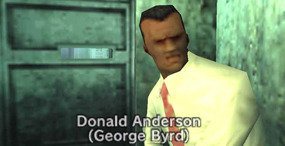
DARPA Chief Donald Anderson
First mission: Save the DARPA Chief Donald Anderson. Should be easy enough as there is no boss encounter between getting into Shadow Moses and getting to the DARPA Chief. But when he died by FOXDIE, that’s when Fisher began to question things. Since using FOXDIE was willing, this could lead to Naomi explaining that this was possibly Decoy Octopus. With how well he can copy a person, even their blood, that wouldn’t stop the virus that was already in him from affecting him. So off the bat, they can’t be sure if Decoy Octopus’ words can be trusted.
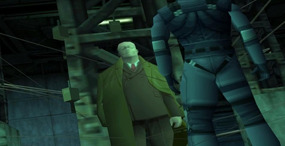
President Baker
So while Snake was willing to go outside, Fisher is a guy who prefers the stealth route. Sadly, because of the height, he couldn’t likely go back the way he came. So he will likely meet Meryl the same way as Snake. Hearing the commotion outside, he would assume the prisoner in the previous room was the soldier holding him up. So likely planned by Decoy, the two would be ambushed and face the Genome soldiers as well. Between Meryl’s assault rifle and Fisher’s own excellent aim, they take out the invaders.
Like Snake, Fisher would likely figure out where President Baker is based on the schematics and the obvious construction job. Sadly, this also means he would be confronted with Revolver Ocelot. Since I believe Fisher is a better aim than Snake (as well as having an assault rifle) I can see Fisher beat Ocelot. So he reached President Barker and found out the terrorist got his code. But knowing that Anderson was Decoy Octopus, they could figure that they only have one code.
And with them talking about the card keys needing to be used to override the detonation codes, they could figure it out right then and there that the plan was to use them to have the ability to launch Metal Gear. And when Baker dies of FOXDIE, Fisher would likely confront Naomi about this. Since Third Echelon is under the National Security Agency (NSA), they would likely go over Jim Houseman’s head and directly to the president about this like in MGS. All the while Fisher would continue to take out the Terrorist and ensure the Metal Gear is safe.

Otacon
Sneaking would go smoothly until the Tank. That’s because there’s a big wide open area between the two buildings and a tank in between. And thanks to Octopus and Ocelot, they would know he is coming. Positive note, thanks to his SC-20K he could likely see the Tank from across the battlefield. Thing is, Vulcan Raven went with the Tank to confront Snake to see the legend for himself. With them not knowing who this is, and thinking he may be still falling for the “we need him to bring us the key code” trap, they may allow him to pass that area.
Fisher would likely still need the remote missile launcher for the Gas area. But I’m sure he can use it. But now he has to confront Gray Fox/Cyborg Ninja. Fisher would likely attack to protect Otacon, but facing him would be tricky. Snake is the superior hand to hand fighter and Gray Fox is a rival. In theory, he could use the Camera Jammer to disable Fox’s vision, but he would need to continually point at him to blind him.
Luckily for Fisher he could pick up some Chaff Grenades to disable Fox enough to shoot at him. And I doubt he would want to fight Fisher hand to hand like Snake. So between that and Fisher’s aim and weaponry, I can see him survive long enough for Fox to retreat. And Otacon is safe since he was never affected by the FOXDIE like the other two.
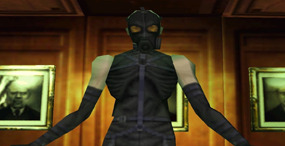
Psycho Mantis
Fisher would likely find Meryl using the same tactics he would take out any normal guard, grab her before she realizes. Through there he’ll find out about the Key Card and have to bring her along. Too bad for Snake, Psycho Mantis is close by and takes control of her mind. Now the question remains: how did Snake beat Psycho Mantis? Shouldn’t he be able to control Snake’s mind like he did Meryl?
This is tricky since the main way to defeat Psycho Mantis is to break the 4th Wall. According to the Wiki, this was because the idea of defeating Psycho Mantis was “to clear your mind”. And with such a display on his mind reading prior, Snake (and likely Fisher) would figure the best way to beat a mind reader is to not have thoughts. Just the killer instinct to win. So if Snake could overcome a mind reader, so should Fisher.
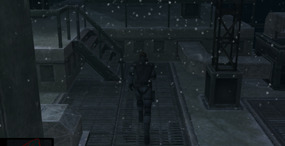
Communication Tower
After that, it makes sense for them to confront Sniper Wolf the same way. An advantage for Fisher is he would have access to a Sniper like weapon already by modifying the SC-20K. So he could fight off Sniper Wolf right here and then. Problem is Meryl would be injured. I figured by this point Otacon is accessible and Fisher convinces him to take Meryl someplace safe and away from everywhere. So even considering the time for Otacon to arrive, that would mean there would be no ambush for Fisher unlike Snake who needed to backtrack to get a sniper rifle.
But for fun, let’s say there was one and Fisher had to go through the torture. He’s a tough guy too, so he could likely take it. Not to mention there would be key differences: with Meryl with Otacon, Ocelot has to be more cautious to keep Fisher alive. And them mentioning Octopus and asking about how the Key Card works means Fisher would know they don’t have the codes. Getting out of jail would be easy. Fisher is a master of stealth and Johnny isn’t the brightest bulb in the world.
Regardless, Fisher would enter the door but use his camera to realize there’s a camera in the room. With his Camera Jammer, he can reach the tower without alerting all the guards his way. And he can do that all the way up, meaning there would be no reason for Liquid to be waiting for him above the Communication Tower with the Helicopter. And even if Liquid is there, he just needs to escape long enough to get the Stinger Missiles to fight it.

Sniper Wolf/Vulcan Raven
The Elevator Ambush would be the biggest thing. By this point, Fisher would have known about the Stealth Camo. So when he exits the elevator, he could use his Goggles to see the other four there under the guise of trying to lighten his load. And take them out before they realize he knows they’re there. And seeing the advantage of such technology, Fisher could use it. But let’s not and continue. Regardless of the above, he’ll meet Sniper Wolf again and take her on in a Sniper Duel.
Between his expert aim and his own sniper rifle, I’m sure he can beat her. He can sneak his way to the big elevator where even the guards would notice someone activating it and have that ambush. And Fisher can out gun them. Fisher won’t attack the ravens but I bet they would alert Vulcan of Fisher’s approach. Between Fisher’s superior stealth and likely having access to the same weaponry as Snake by this point, I can see Fisher manage to beat Vulcan Raven as well.

Metal Gear
Now, by this point, they would figure out that there is no code and the key is the only way to access it. So with Grim finding out how the key card works, he would likely use Liquid and Ocelot’s plan of tricking him into an ambush. So when Ocelot shoots the key out of Fisher’s hand, Fisher would pull out the SC-20K to take out both Liquid and Ocelot right there. It’s a small room and not a lot of places to cover. And if they do find cover, it just means Fisher could use the more damaging weapons to finish the job and destroy the computers.
And with FOXDIE being given to him on purpose, even if they survive by this point they’re days are numbered. With the two remaining villains dead and control of the Metal Gear disabled, all that’s left to do is blow the joint. That’s when they could launch a missile strike against Shadow Moses and destroy everything. Fish, Otacon and Meryl escape and thus Metal Gear was never a threat.
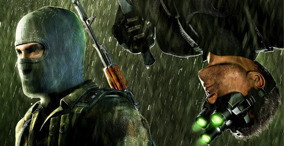
Overall
Because FOXHOUND couldn’t infiltrate Third Echelon since they wouldn’t use Mater Miller at all, Fisher would have an easier time. Since Fisher isn’t Snake and just some other soldier, they would more than likely let him be thinking he would be easier to trick since he isn’t a legendary soldier. All the while being able to make judgment calls and figure out that they don’t have the codes.
After all, Snake is a great soldier. He is willing to follow orders even when betrayed. But Fisher is not a great soldier, he’s a great spy. And like spies, they know when following orders isn’t the best option.
11 notes
·
View notes
Text
Endwalker - Autumntide Music Video an Essay
Sometimes you just need a place to gush about something you are really passionate about. After a not-so-fun week of dealing with Covid I happened back upon the music video for Endwalker - Autumtide. So here is where I gush about how Final Fantasy ties all my favorite art-related things together.
At this point, Endwalker has been out for over a year, and there are so many details in this music video I’ve still probably missed. One of my favorite things in FF14 is the concept of Hope. Everyone has a different story for their WOL, but no matter how grim the circumstances, there will always be our character, marching on through whatever trial we face. No matter how often we get knocked down, we get right back up and continue on.
So Miya, how does this music video have anything to do with Hope?
Well skeptical Miya, the music video starts off with a younger woman mosing about her home. She’s aimless, fumbling with a bottle and looking at the dead plants in her space. She sings along to the lyrics -Fade away-. I like the idea of this woman not only being the player, not necessarily the WOL, but us the player.
As the song and video continue on she passes someone reading Count Fortempt’s novel this is matched with the lyrics -Sorrow's silence, we needn't bear-. Next, as she is walking up an overpass bridge she sees a woman resembling Yotsuyu smoking a pipe on the bridge, -Every step we take echoes in our wake-. Finally, she’s alone in the park, tired and breathless from her day of searching. The sun is setting and looking up she sees a figure waving to her as they walk away -To forge ahead-.
At the start of the video the protagonist is drawn by a glimmering light, and she follows it out of her home. Like I said she’s looking at everything in her house, and looking outside before finally, something draws her in, but we also get these flashes of an internal dialogue where she’s alone, upset, and anguished by this trial she’s going through. -Marching forward, left behind.-
Every step you take forward on any journey in life, you are going to leave something behind. This is true for not only your character as the WOL, but as you the player, and for the protagonist in the video. The woman could continue to stay in her house and that would be her story, she continues to stay and be sad and just fade away. For whatever reason, she chooses to leave and head outside and explore the world.
There doesn’t seem to be a destination in mind for her, but she passes these characters along the way, and in doing so they mimic some of the characters we’ve left behind in the game. I find myself drawn most to the person reading the novel and how it’s matched with the lyrics -Kindred severed neverwhere, Sorrow’s silence, we needn’t bear.- Ironically, “A smile best suits a hero.” Kindred - family, severed - cut off, and neverwhere- no where. Now neverwhere also has me a little thrown for a loop because it’s the title of a Neil Gaiman novel (Why is it always Neil Gaiman). I would love to go on another deep dive just by that one word alone, but that might be a little extreme.
I’ll be honest I story-skipped Heavensward and Stormblood and went straight for Shadowbringers, (Look I started ARR before Stormblood, and then restarted somewhere before Shadowbringers. I’ll go back and do it at some point.) So I only know a little about Yotsuyu and Tsukiyomi, (that’s not true I’m obsessed with moon mythology). I love the image of her watching traffic as it flows around her at twilight. There is so much movement, but she’s standing still, and our protagonist is surprised to see her there.
During these scenes, we see those moments of our protagonist anguishing by herself, before coming to the park and seeing the figure waving at her as they leave -Marching forward, left behind-. Then the protagonist is lost in a multitude of sceneries, continuing on her journey. -Should we lose our way, tired of all this pain- We don’t see her anguishing anymore, but there is a moment of weakness as she’s on the ground before looking up at this blinding white light.
I’m slightly pausing here before I noticed something while writing this, in the last scenes we get a reflection of her shoes and how they are dirty and worn. -Forge ahead-. In the start of the music video when our protagonist first leaves her home, her shoes are white and clean if not brand new. Just like our character when starting this journey. Watching through they actually show the shoes quite a few times and how scuffed and worn they are becoming. Another thing I noticed towards the end before she’s leaning over in the dirt is how her hair has noticeably changed if not grown longer. This could just be unintentional, but I like that it shows the physical passage of time on this character.
So Miya, I’ll ask again, what does this have to do with hope?
If you’ve played through Endwalker, you know the entire plot boils down to a bird with depression. Our WOL is the reincarnation of the last Azem shepherd of stars in the dark. We could see the story in a few ways. Our character could very much just be a tempered weapon for Hydalyn, we do cause a fair bit of trouble along the way…then we could ask what victory is worth this price. Do you sit in hopelessness and wait for whatever outcome, or do you go out and make a difference? It’s a very human concept, and it blends beautifully into meeting Venat and learning ‘Your answer’.
The game started with a Calamity. If you play for an hour or through the entire game, you have your own reason for playing. A reason for living in this beautiful world. No matter what brought you to this point, it’s cannon not just to you, but to everything around you. No matter how many times something has pushed you down, you’ve gotten back up and overcome it. You might have just evaded the obstacle for now, but that’s part of life. Not every boss you defeat stays dead, just look at Zenos. Not every action you make will change the outcome of the scenario, look at Elpis and how we went there knowing we couldn’t change their future.
Saying that though makes me want to reflect on Shadowbringers, and how one timeline’s wish to change reality was able to change reality in its entirety. It wasn’t impossible, only improbable.
And should you lose your way, tired of all this pain, don’t be afraid to forge ahead.
Much love,
Miyako Sora
#final fantasy xiv#endwalker#ff14#writing#essay#shitty essay#just rambling#maybe it's the fever talking#but i cried like three times writing this
7 notes
·
View notes